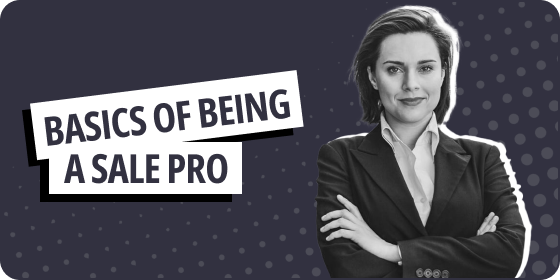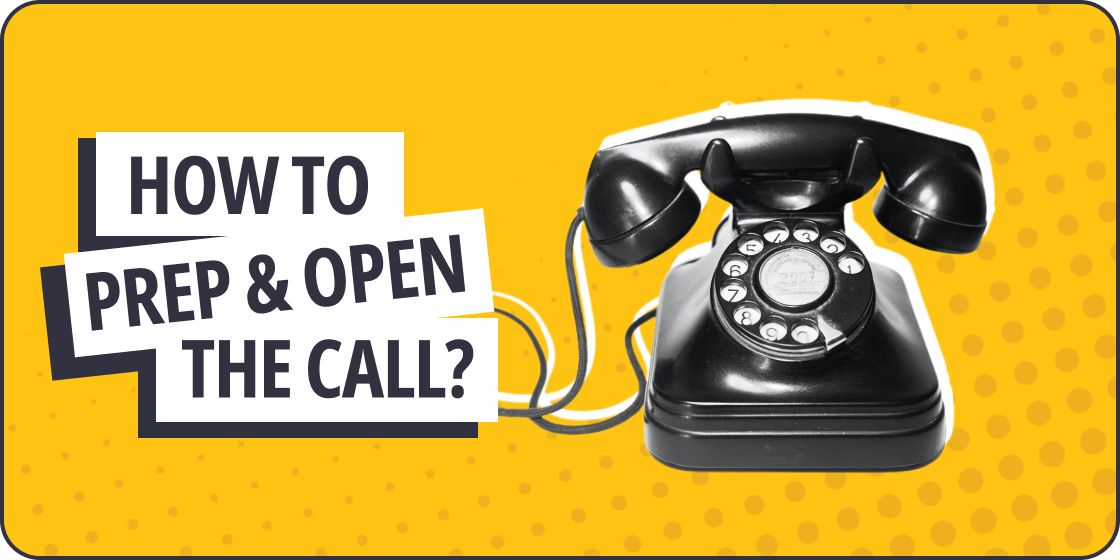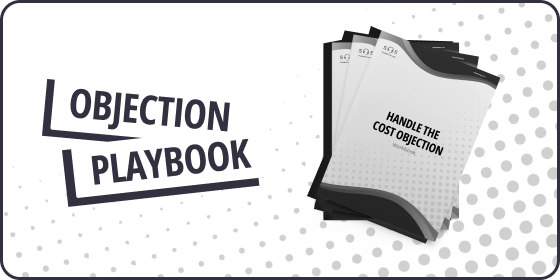HOW TO HANDLE THE “I NEED TO TALK TO MY SPOUSE/PARTNER” OBJECTION

Dealing with objections is a challenge especially when you don’t have both decision makers on the call or in the room. This lesson will provide you with a process to handle when a prospect says they need to talk to their spouse or business partner before they make a decision.
WHAT DOES IT SOUND LIKE?
- This sounds great. I just need to talk to my spouse. Can you call me back in a few days?
- This sounds really good, I just need to talk to my spouse. We don’t make purchase decisions without talking to one another first.
- Sounds great, I just need to talk to my business partner, the board, legal, etc…
WHAT DOES THIS MEAN?
We need to help them overcome the objection or we need to figure out what the real objection is.
WHY YOU’RE HEARING IT?
Most prospects don’t realize they have a problem when you first speak with them. If they are aware, many times they don’t realize how big the problem is nor the likely risks and consequences of doing nothing. The most likely reason you are hearing this objection, especially if it is from the spouse is that you have not identified a great enough problem or need and haven’t created enough urgency to confidently move out of their current “As Is” state and into their desired future “To Be” state.
There is a pre-established mutual agreement between the spouse/partners that neither one of them would make a buying decision without the other’s knowledge and/or agreement. Particularly on expensive, high-priced purchases. A several hundred dollar purchase may not require permission whereas a several thousand dollar one does.
HOW TO HANDLE THE OBJECTION: B2C APPROACH
Pro Tip: Avoid being told that they need to talk to their spouse!
Early in the discovery/qualifying process, you should have asked “Other than yourself, who else is involved in making this decision?” as well as fully qualified the current state of problems, the desired result, and the consequences of keeping the status quo.
Step 1: Agree with them
“Sure, that’s not a problem. But…let me ask you,
Step 2: Ask Consequence Questions
How does your spouse feel about you (problems they want to solve and the desired outcomes)?
Exp. How does your spouse feel about you struggling to control your weight, not exercising and eating healthy but wanting to get in the best physical shape of your life so that you can get back to running marathons and be there for your kids?
What would happen if your spouse said no to you (your service/solution and the desired outcomes)?
Exp. I understand but, what would happen if your spouse said no to you getting a gym membership and personal trainer so you can lose weight, get physically fit, and be in the best shape of your life?
Why do you think they would be opposed to you (your service/solution and the desired outcomes)?
Exp.Well, why do you think they would be opposed to you getting a gym membership and personal trainer so you can lose weight, get physically fit, and be in the best shape of your life?
If you don’t do something about (problems they want to solve), how are you going to ever (desired outcomes)?
Exp. That makes sense but, if you don’t do something about your weight, fitness, and eating habits, how are you going to ever get in the best shape of your life so that you can run that 10K and be there for your kids as you get older?
*If they still haven’t agreed to get started or given you the real reason they need to talk to their spouse/partner schedule a 2nd meeting to discuss as a group but also use that as a tool to uncover the real objection.
Step 3: Schedule the 2nd meeting and uncover the real objection
Ok, no problem. What’s your time frame for getting back to me?
What I can do to make things easier for you is; if you pull up your calendar I can pull up mine and you can book a specific time in with me to speak to you and your spouse together. This way you don’t have to chase me down and vice versa. Does that sound fair?
*NEVER agree to a random callback. Always agree to a specific day/time and send an invite
Now, before the three of us talk on Tuesday, just so I am prepared for the call what questions and concerns do you think your spouse is going to have? This way I can be ready to answer them.
*Now you can address the real concern and close the deal then and there. If you still cant get them to move forward you have a boomed meeting with both parties.

HOW TO HANDLE THE OBJECTION: B2B APPROACH
Pro Tip: Avoid being told that they need to talk to their business partner!
Early in the discovery/qualifying process, you should have asked “Other than yourself, who else is involved in making this decision?” as well as fully qualified the current state of problems, the desired result, and the consequences of keeping the status quo.
Step 1: Agree with them
“Sure, that’s not a problem. But…let me ask you,
Step 2: Ask Consequence Questions
How does your business partner feel about you (problems they want to solve and the desired outcomes)?
Exp. “Sure, that’s not a problem. But…let me ask you, how does your business partner feel about the SDRs struggling to book meetings that stick and the sales reps sitting more meetings so they can close more sales?
What would happen if your business partner said no to you (your service/solution and the desired outcomes)?
Exp. I understand but, what would happen if your business partner said no to you giving your sales team the training and resources they need to book better meetings and close more sales?
Why do you think they would be opposed to you (your service/solution and the desired outcomes)?
Exp.Well, why do you think they would be opposed to you giving your sales team the training and resources they need to book better meetings and close more sales?
If you don’t do something about (problems they want to solve), how are you going to ever (desired outcomes)?
Exp. That makes sense but, if you don’t do something about the SDR’s not hitting their booked meeting targets and the sales reps doing a better job qualifying, listening, and building value, how are you going to ever get the Account Executives to close more sales?
*If they still haven’t agreed to get started or given you the real reason they need to talk to their spouse/partner schedule a 2nd meeting to discuss as a group but also use that as a tool to uncover the real objection.
Step 3: Schedule the 2nd meeting and uncover the real objection
Ok, no problem. What’s your time frame for getting back to me?
What I can do to make things easier for you is; if you pull up your calendar I can pull up mine and you can book a specific time in with me to speak to you and your business partner together. This way you don’t have to chase me down and vice versa. Does that sound fair?
*NEVER agree to a random callback. Always agree to a specific day/time and send an invite
Now, before the three of us talk on Wednesday, just so I am prepared for the call what questions and concerns do you think your business partner, legal, board, etc. are going to have? This way I can be ready to answer them.
*Now you can address the real concern and close the deal then and there. If you still can’t get them to move forward you have a booked meeting with all parties.
WORKSHEET:
Now it’s time to build your structures for responding to “I need to talk to my spouse/partner and practice having the conversation until the process is memorized and personalized!
Use the information you’ve learned to come up with a structure that lines up with your buyer whether spouse or business partner.
My advice is to read, write and rehearse the objection handling structure as often as possible. This will help your response to the objection sound and feel real, understanding, and empathetic.
Step 1: Agree with them
“Sure, that’s not a problem. But…let me ask you,
Step 2: Ask Consequence Questions
How does your spouse/partner feel about you (problems they want to solve and the desired outcomes)?
Exp. How does your spouse feel about you ____________
so that you can _________________?
What would happen if your spouse/partner said no to you (your service/solution and the desired outcomes)?
Exp. I understand but, what would happen if your spouse said no to you ________
so you can ________________ ?
Why do you think they would be opposed to you (your service/solution and the desired outcomes)?
Exp.Well, why do you think they would be opposed to you _______
so you can ___________?
If you don’t do something about (problems they want to solve), how are you going to ever (desired outcomes)?
Exp. That makes sense but, if you don’t do something about _____________,
how are you going to _________ ?
Step 3: Schedule the 2nd meeting and uncover the real objection
Ok, no problem. What’s your time frame for getting back to me?
What I can do to make things easier for you is; if you pull up your calendar I can pull up mine and you can book a specific time in with me to speak to you and your __ together. This way you don’t have to chase me down and vice versa. Does that sound fair?




























